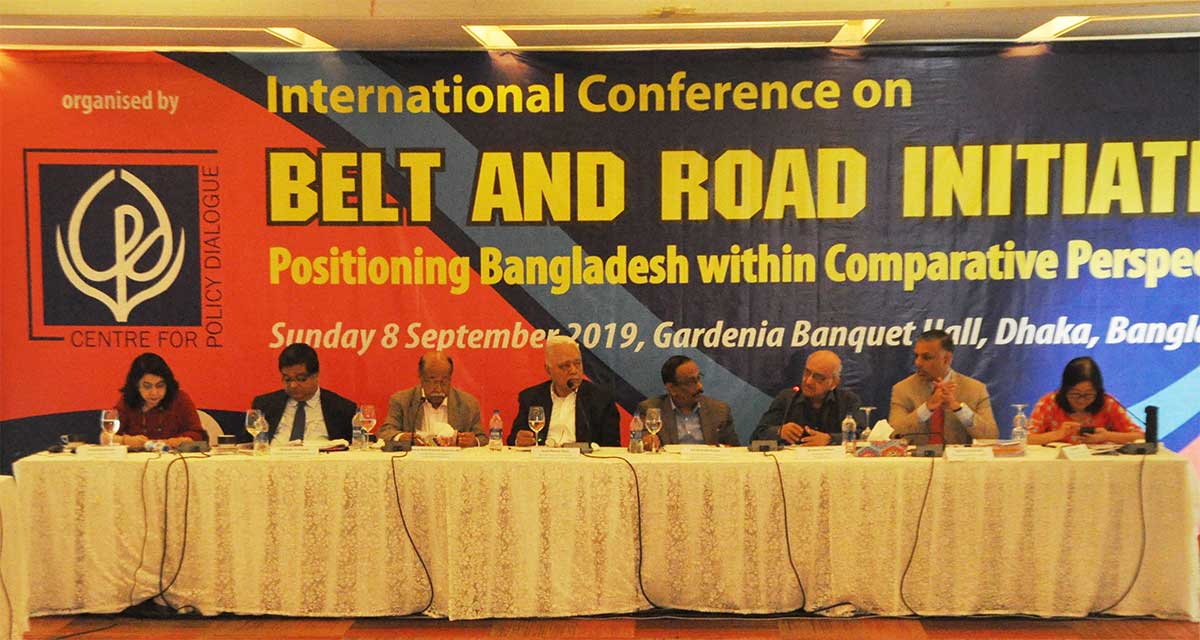
The Belt and Road Initiative (BRI), launched by the Chinese Government, is known to be the most ambitious infrastructure project of the century which stretches from East Asia through Europe. As China intends to engage in the global economy mainly through investments in infrastructure, it will require enhanced openness and transparency in implementing the projects in countries like Bangladesh. The BRI offers many opportunities, but its implementation will require preparedness of the partner countries.
Experts shared these observations at the international conference titled “Belt and Road Initiative: Positioning Bangladesh within Comparative Perspectives” organised by the Centre for Policy Dialogue (CPD) on 8 September 2019 in Dhaka.
The conference was organised to improve understanding on the Belt and Road Initiative and discuss the economic and political dynamics of this visionary development initiative of the People’s Republic of China from Bangladesh’s development perspective. Apart from the opening and closing sessions the day-long conference was had two thematic plenary sessions – the session 1 “Economics of BRI” and session 2 “Politics of BRI”.
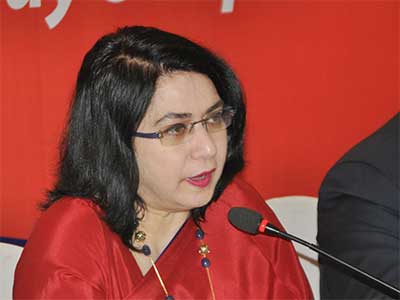 Dr Fahmida Khatun, Executive Director, CPD, presented a keynote titled “Belt and Road Initiative: What are Bangladesh’s Interests?” at the opening session of the conference. In her presentation, Dr Khatun, discussed the financing mechanism of BRI, linkages between BRI and global goals such as the Sustainable Development Goals (SDGs), Paris Agreement and position of Bangladesh in the BRI as regards infrastructure, trade, finance and cultural relationships. Dr Khatun noted that, the China has been investing in various sectors of Bangladesh such as roads and transportation, power and energy, special economic zone and financial sector.
Dr Fahmida Khatun, Executive Director, CPD, presented a keynote titled “Belt and Road Initiative: What are Bangladesh’s Interests?” at the opening session of the conference. In her presentation, Dr Khatun, discussed the financing mechanism of BRI, linkages between BRI and global goals such as the Sustainable Development Goals (SDGs), Paris Agreement and position of Bangladesh in the BRI as regards infrastructure, trade, finance and cultural relationships. Dr Khatun noted that, the China has been investing in various sectors of Bangladesh such as roads and transportation, power and energy, special economic zone and financial sector.
Dr Khatun also mentioned that while implementing BRI projects, Bangladesh should be mindful about financial, social and environmental risks of large projects. She also emphasised on local participation while designing and executing BRI projects in Bangladesh
Mr Syed Manzur Elahi, Member, Board of Trustees, CPD, and Former Advisor (Minister), Caretaker Government of Bangladesh (1996 and 2001), chaired the opening session of the conference.
Dr Sachin Chaturvedi, Professor and Director General, Research and Information System for Developing Countries (RIS), India, and Professor Cheng Min, Institute for Bangladesh Studies, Yunnan Academy of Social Sciences, China, shared their views as distinguished commentators at the opening session.
As special commentator at the opening session of the conference, Professor Rehman Sobhan, Chairman, CPD, said that as China is investing in various sectors Bangladesh needs take part in the negotiations effectively for the greater interest of the people. The government also should also focus on prioritising policies through assigned regulatory bodies to manage all the BRI related projects in a coordinated way.
As a Special Guest at the opening session of the conference, Mr Mahbub Uz Zaman, Bangladesh Ambassador-Designate to China, mentioned that Bangladesh should carefully deal with the interest rates and related conditionality that comes with the BRI projects.
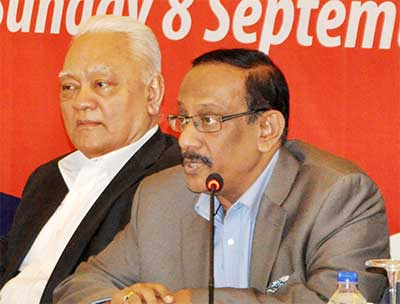 Mr Md. Shahidul Haque, Senior Secretary, Ministry of Foreign Affairs, Government of Bangladesh, spoke as the Special Guest at the opening session of the conference. He mentioned that Bangladesh’s geographical position is critical for the BRI to utilise the South Asian corridors and regional cooperation. If utilised properly the BRI can be a way to improve the regional development scenario through trade and technology transfers.
Mr Md. Shahidul Haque, Senior Secretary, Ministry of Foreign Affairs, Government of Bangladesh, spoke as the Special Guest at the opening session of the conference. He mentioned that Bangladesh’s geographical position is critical for the BRI to utilise the South Asian corridors and regional cooperation. If utilised properly the BRI can be a way to improve the regional development scenario through trade and technology transfers.
Hon’ble Minister, Ministry of Industries of the Government of Bangladesh Mr Nurul Majid Mahmud Humayun, MP, was present at the opening session of the conference as the Chief Guest. He said that China is one of the major development partners of Bangladesh and the government is very much willing to strengthen the relationship further. He also said that BRI is a win-win situation for us to tackle the challenges and utilise the opportunities effectively.
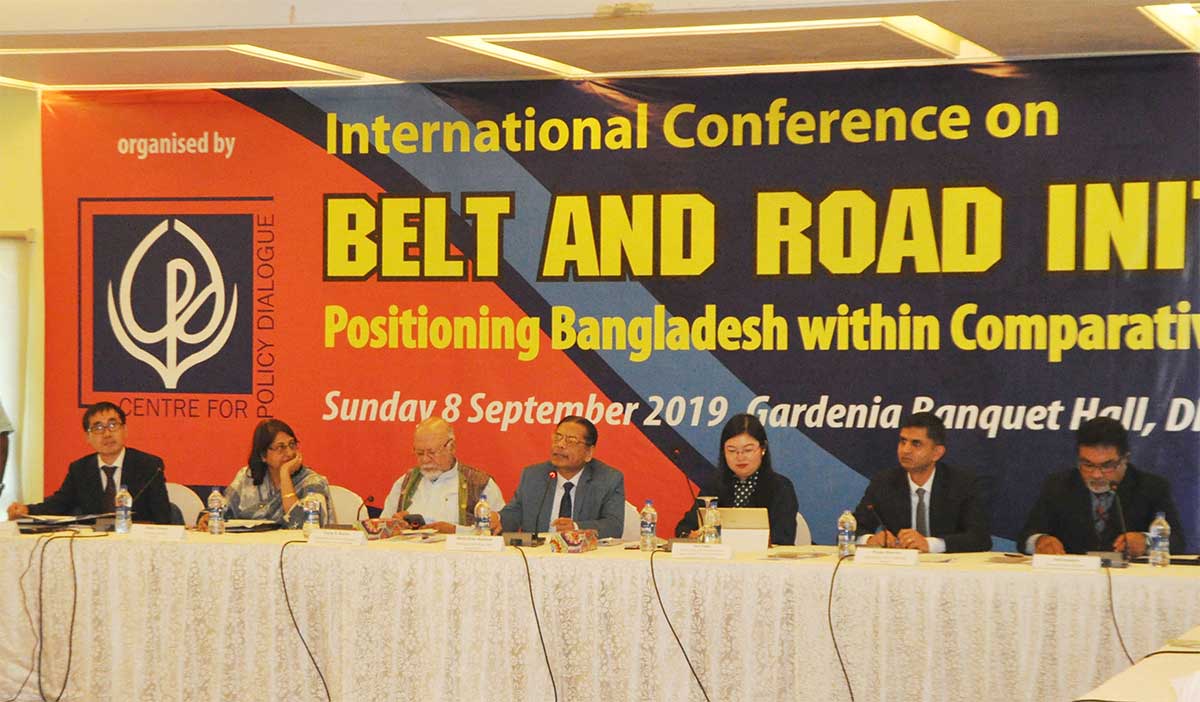
Chaired by Professor Mustafizur Rahman, Distinguished Fellow, CPD, the first session of the conference dealt with economic aspects of BRI. Ambassador Tariq A. Karim, Consultant, South Asia Regional Integration, the World Bank, and Advisory Consultant, Bangladesh Enterprise Institute (BEI), was present as Special Commentator at this session. Mr Asif Ibrahim, Executive Council Member, ESCAP Sustainable Business Network (ESBN), Dr Liu Jinqian, Assistant Professor, Shanghai Academy of Social Sciences, China, Dr Puspa Sharma, Deputy Executive, South Asia Watch on Trade, Economics and Environment (SAWTEE), Nepal, Ms Sun Xiqin, Editor, South and Southeast Asian Studies Journal, Yunnan Academy of Social Sciences, China, Professor Nisha Taneja, Indian Council for Research on International Economic Relations (ICRIER), India, spoke at this session as panelists.
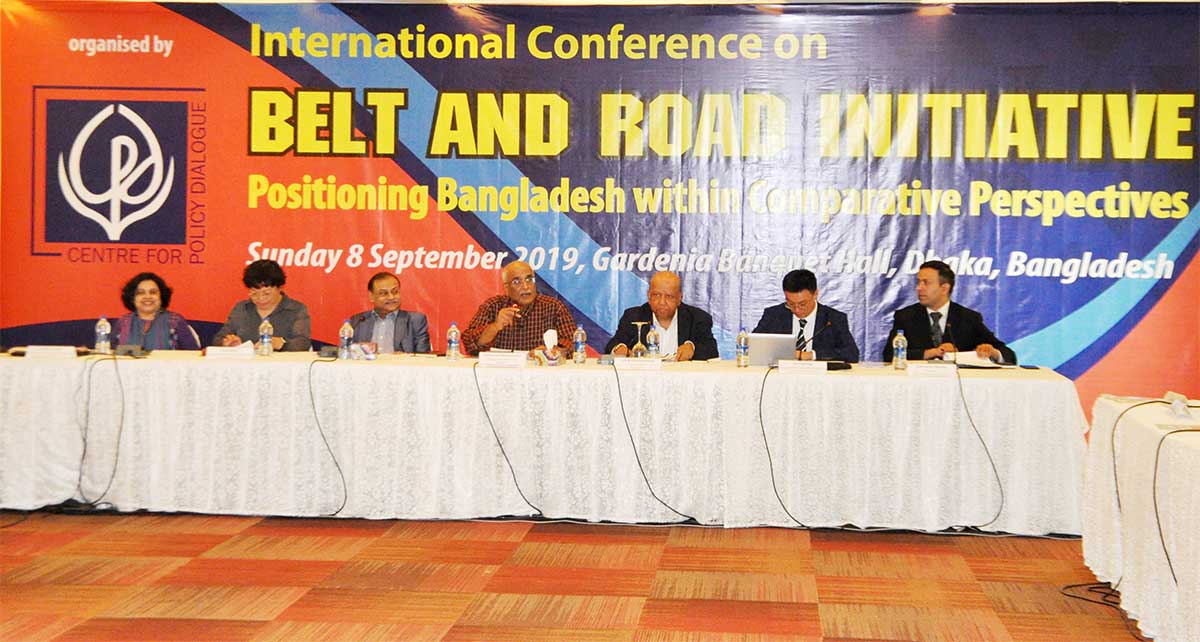
Dr Debapriya Bhattacharya, Distinguished Fellow, CPD, chaired the second session on “politics of BRI”. Mr Abul Hasan Chowdhury, former State Minister for Foreign Affairs of the Government of Bangladesh, was present as Special Guest at this session. Major General A N M Muniruzzaman, ndc, psc (Retd), President, Bangladesh Institute of Peace and Security Studies (BIPSS), Dr Lin Yanming, Associate Professor and Deputy Director, Institute of South Asian Studies, Yunnan Academy of Social Sciences, China, Dr Kalyan Raj Sharma, President, Nepal-China Friendship Forum, Nepal, Ms Guo Suiyan, Associate Professor and Deputy Director, Institute for Bangladesh Studies, Yunnan Academy of Social Sciences, China, Professor Lailufar Yasmin, Department of International Relations, University of Dhaka, Deputy Director, Bangladesh Institute of Law and International Affairs (BILIA), spoke at this session as panelists.
The conference attracted a large number of participants. Experts from China, India, Nepal and Bangladesh, policymakers, political leaders, academics and experts, business leaders, civil society members, international development partners and representatives of the media among others took part at the three sessions of the conference.



